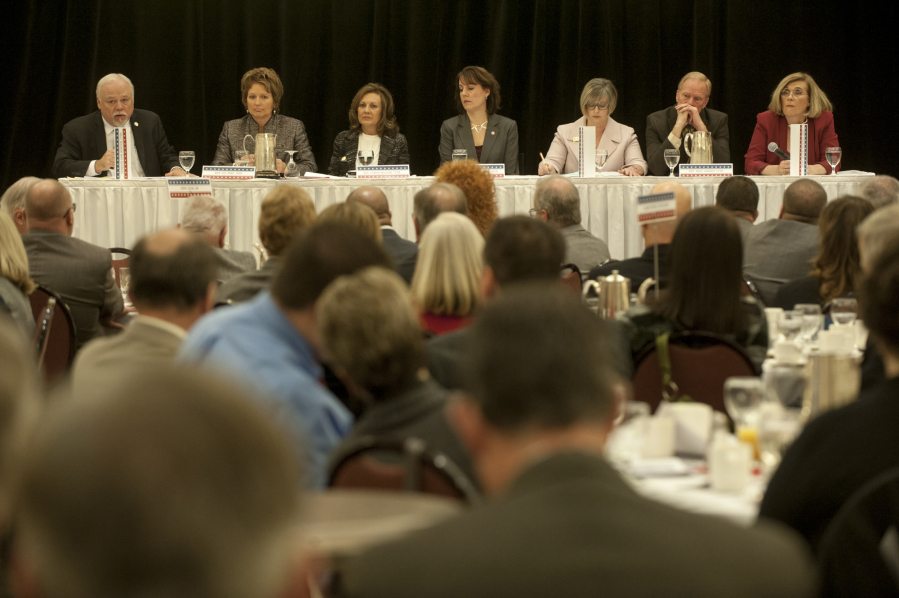About twice a month during the legislative session, lawmakers representing Pierce County gather over lunch in the state Capitol’s basement. The noon hour conversations help them identify, and some believe deliver, their region’s top priorities.
Here in Southwest Washington, lawmakers can’t remember the last time they were all in the same room on their own accord.
There is a “complete lack of trust” within the local delegation, said Sen. Annette Cleveland, D-Vancouver.
“There are personality conflicts that come and go, and I can never keep track of who’s talking to whom,” she said, attributing it “to politics being put before relationships.”
In the most recent legislative session, local lawmakers were blindsided when they couldn’t secure money for a local program underway to integrate mental health, chemical dependency and physical health services for Medicaid clients. The blame cannot squarely be placed on the local delegation, but the effort to keep the approximately $7 million in reserves revealed a long-standing fissure among the Southwest Washington delegation.
The end-of-session scramble wasn’t the first time a chasm was evident within the delegation. When the state approved a $16 billion transportation package in 2015, many local lawmakers criticized it as a “raw deal” for Clark County and pointed to frictions within the delegation as the reason. And the effort to revive conversations about the future of the Interstate 5 Bridge, perhaps the issue of most region-wide significance and yet the most divisive, continually fails to gain momentum.
Mental health funding
On the final day of the 2016 legislative session, Rep. Sharon Wylie, D-Vancouver, gave an impassioned speech explaining her vote against the supplemental operating budget.
Wylie said the budget is “shortchanging our community systems” and would hurt those who rely on mental health services in Clark County.
Southwest Washington is moving faster than the rest of the state to fully integrate mental health, chemical dependency and physical health services for Medicaid clients. By adopting the new integrated model early, the region risked losing the millions it had saved while operating under another model.
Many Southwest Washington legislators had hoped to keep a portion of the cushion for local health care efforts. Instead, the money will be funneled into the state’s general fund and revert back to the federal government.
Up until the final days, many members of the local delegation thought the money for Clark County would be included in the final budget.
But Sen. Ann Rivers, R-La Center, who arguably has the most sway over the budget writers out of anyone in the local delegation, was unaware other members of the delegation were working to ensure the money was there.
“Honest to Pete, I had no idea about any of this until it was too late to do anything about it,” Rivers said, pointing out she did manage to save some money for the county. “I got $1.5 million, which was nothing short of a miracle.”
The communication chain failed at several different points and levels, starting at the nonprofit level going to the county and finally, to the state.
In the final moments, “it was a small piece of a lot of communication, and it’s hard to convey how fast-moving and complicated it is,” Wylie said.
Later she added, “In retrospect, one thing I intend to do … is create avenues of getting the delegation together in a general way, to brainstorm and share information.”
Transportation woes
When the state finally approved a $16 billion transportation package in 2015, the first since 2005, many local lawmakers criticized the package.
Senate Transportation Committee Vice Chairman Don Benton, R-Vancouver, told a community group, “There were legislators in King County, because they stuck together as a team, they got over a billion dollars. … They stuck together, across party lines, Democrat and Republican. … And if we could do that, we would do better in a transportation situation.”
More recently, some local lawmakers believed money in the capital budget to preserve the 142-year-old Providence Academy would have been approved sooner if not for a kerfuffle and miscommunication within the delegation.
And in the previous couple of legislative sessions, local lawmakers have tried numerous times to spark conversations about the future of the aging and congested Interstate 5 Bridge, but can’t agree on how to kick off the preliminary conversations.
There is also the well-documented spat between Rivers and Benton several years ago, which could still be a factor. The two senators used demeaning language toward each other, including Benton saying Rivers was acting like a “trashy trampy-mouthed little girl.”
“The battle between Don Benton and I was a real negative, and I think it prevented people getting together this year,” Rivers said.
It wasn’t always this way. In 2005, the delegation was known as the “Clark County mafia,” according to Craig Pridemore, a former Democratic senator.
“When it came to protecting the district, the county, the community, we didn’t care what party it was,” Pridemore said. “We all got together and said, ‘You’re not going to do this.’ And it’s typical around the state. The strong delegations do that.”
Pierce County’s strength
The 20-plus members of Pierce County’s delegation often work together, despite their political diversity and the diversity of the communities they represent. Pierce County, Washington’s second-most populous, includes the city of Tacoma, suburban cities, farms, Joint Base Lewis-McChord and Mount Rainier.
“It’s always been about looking for the things we can agree on and that are important to our community and making sure we can deliver on those,” said Sen. Bruce Dammeier, R-Puyallup, who helps spearhead the delegation’s regular lunch meetings.
In contrast to Clark County, Dammeier points to Pierce County’s portion of the $16 billion transportation package as an overall success for his region.
The comparison isn’t completely fair. Pierce County is a larger delegation, which inherently helps when vying for scarce dollars. But the Pierce County group has carved out a reputation as coming together when necessary.
Rep. Laurie Jinkins, D-Tacoma, said that even though the delegation disagrees frequently on policy issues, the meetings are useful.
“It helps build our understanding of each other. Knowing what issues we can find common ground on helps move the delegation forward,” she said.
The lawmakers representing Pierce County also meet outside the Legislature. They’ve volunteered their time to repackage meals to be used by food banks. They’ve gone to dinner. They are planning a dragon boat outing.
It’s about building relationships, Dammeier said.
Next session
There are plenty of examples of the Clark County delegation working well and effectively together in smaller groups. Even when it came to the mental health funding, Rep. Paul Harris, R-Vancouver said, “I feel like I’ve worked extremely well with the Democrats, and I know I reached out to (Reps.) Sharon Wylie and Jim Moeller and we were all on the same page.”
Next legislative session, the stakes will be high, and the local dynamics will inevitably shift.
Moeller is leaving to run for lieutenant governor. Benton is retiring, and Rep. Lynda Wilson, R-Vancouver, is running for his seat.
Sen. Cleveland said she’s committed to organizing a meeting with the delegation.
“I would be willing to take it on and organize it before session next year. … It’s a good idea,” Cleveland said.




